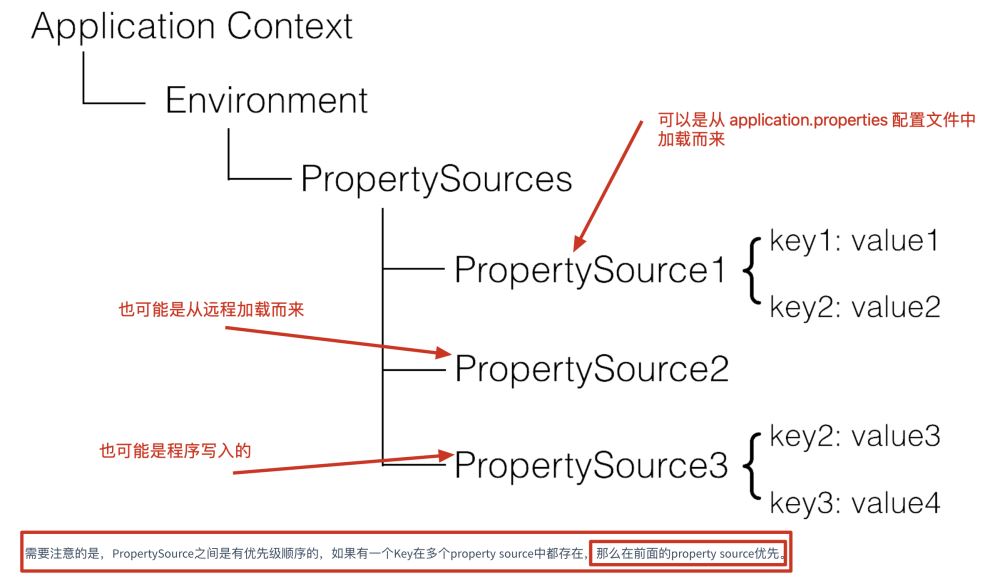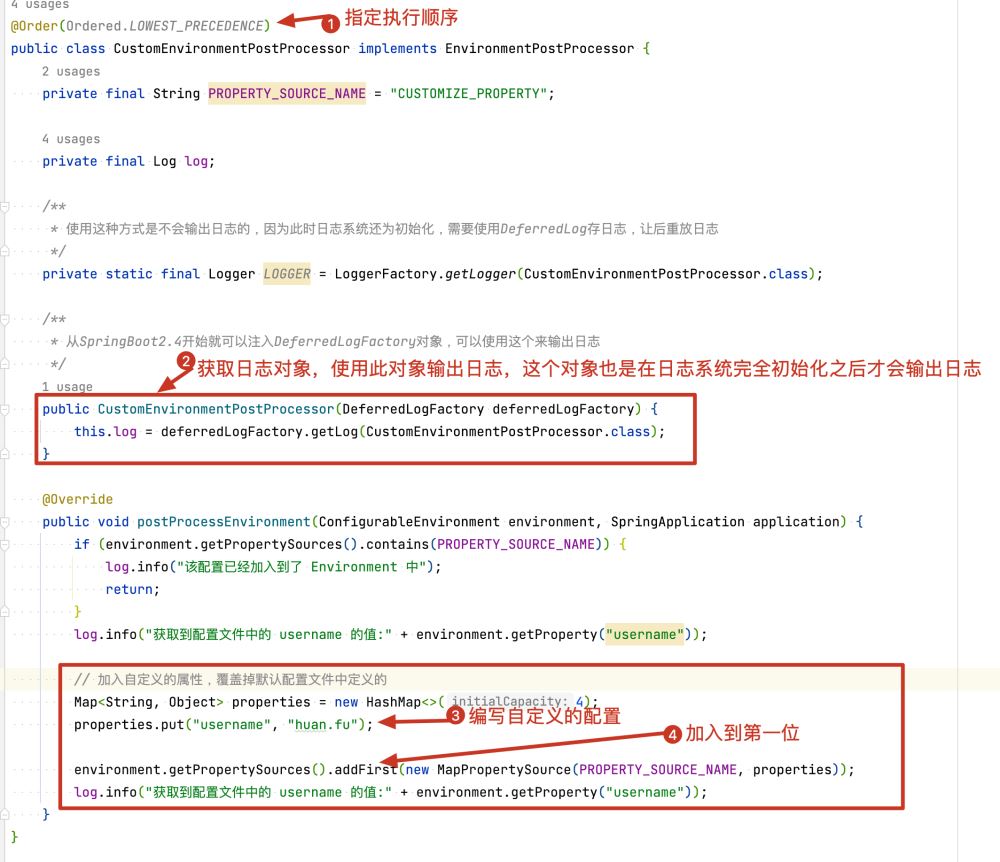How to use SpringBoot's EnvironmentPostProcessor
1. Background
The Apollo configuration center was used in the previous project. After docking with the Apollo configuration center, the properties of the configuration center are It can be used in the program, so how is this implemented? When were the properties of the configuration center loaded into the program? So if we find out how this is implemented, can we load configuration properties and encryption and decryption functions of configuration properties from anywhere?
2. Requirements

From the above figure, we know that our requirements are very simple, that is, the attributes we define need to be larger than the configuration file has a higher priority.
3. Analysis
1. When to add our own configuration properties to SpringBoot
When we want to use configuration properties in Bean, then we The configuration properties must be put into Spring Environment before the Bean is instantiated. That is, our interface needs to be called before application context refreshed, and EnvironmentPostProcessor can exactly implement this function.
2. The priority of obtaining configuration properties
We know that there is a priority for obtaining properties in Spring.
For example, we have the following configuration properties username
├─application.properties │ >> username=huan ├─application-dev.properties │ >> username=huan.fu
So what is the value of username at this time? Here is a picture from Apollo to explain this problem.
Reference link: https://www.apolloconfig.com/#/zh/design/apollo-design

Spring has been added since version 3.1 ConfigurableEnvironment and PropertySource:
ConfigurableEnvironment
Spring’s ApplicationContext will contain an Environment (implementing the ConfigurableEnvironment interface)
-
ConfigurableEnvironment itself contains many PropertySource
PropertySource
Property Source
can be understood as many Key-Value attribute configurations
As can be seen from the schematic diagram above, key appears at the very beginning The priority in PropertySource is higher. In the above example, the value of username in SpringBoot is huan.fu.
3. When to add our own configuration
From the second stepGet the priority of the configuration attribute It can be seen that the higher the PropertySource is, the higher Execute it first, then for our configuration to take effect, it must be placed as early as possible.

As can be seen from the above figure, SpringBoot loads various configurations through EnvironmentPostProcessor, and the specific implementation is ConfigDataEnvironmentPostProcessor to achieve. Then we write an implementation class of EnvironmentPostProcessor ourselves, then execute it after ConfigDataEnvironmentPostProcessor, and add it to the first position in Environment.

4. Implementation
1. Introduce SpringBoot dependency
<?xml version="1.0" encoding="UTF-8"?>
<project xmlns="http://maven.apache.org/POM/4.0.0" xmlns:xsi="http://www.w3.org/2001/XMLSchema-instance"
xsi:schemaLocation="http://maven.apache.org/POM/4.0.0 https://maven.apache.org/xsd/maven-4.0.0.xsd">
<modelVersion>4.0.0</modelVersion>
<parent>
<groupId>org.springframework.boot</groupId>
<artifactId>spring-boot-starter-parent</artifactId>
<version>2.6.6</version>
<relativePath/> <!-- lookup parent from repository -->
</parent>
<groupId>com.huan.springcloud</groupId>
<artifactId>springboot-extension-point</artifactId>
<version>0.0.1-SNAPSHOT</version>
<name>springboot-extension-point</name>
<properties>
<java.version>1.8</java.version>
</properties>
<dependencies>
<dependency>
<groupId>org.springframework.boot</groupId>
<artifactId>spring-boot-starter-web</artifactId>
</dependency>
</dependencies>
</project>2. Configure properties in application.properties
vim application.properties
username=huan
3. Write custom attributes and add them to Spring Environment

Note:
1. If you find that there is no log output in the program, check whether is used slf4jOutput log. At this time, the log cannot be output because the log system has not been initialized. The solution is as follows:
SpringBoot版本
>= 2.4 可以参考上图中的使用 DeferredLogFactory 来输出日志
< 2.4
1、参考如下链接 https://stackoverflow.com/questions/42839798/how-to-log-errors-in-a-environmentpostprocessor-execution
2、核心代码:
@Component
public class MyEnvironmentPostProcessor implements
EnvironmentPostProcessor, ApplicationListener<ApplicationEvent> {
private static final DeferredLog log = new DeferredLog();
@Override
public void postProcessEnvironment(
ConfigurableEnvironment env, SpringApplication app) {
log.error("This should be printed");
}
@Override
public void onApplicationEvent(ApplicationEvent event) {
log.replayTo(MyEnvironmentPostProcessor.class);
}
}4. Make the customized configuration take effect through SPI
1. Create a new# under src/main/resources ##META-INF/spring.factoriesFile

org.springframework.boot.env.EnvironmentPostProcessor=\ com.huan.springcloud.extensionpoint.environmentpostprocessor.CustomEnvironmentPostProcessor
@Component
public class PrintCustomizeEnvironmentProperty implements ApplicationRunner {
private static final Logger log = LoggerFactory.getLogger(PrintCustomizeEnvironmentProperty.class);
@Value("${username}")
private String userName;
@Override
public void run(ApplicationArguments args) {
log.info("获取到的 username 的属性值为: {}", userName);
}
}Copy after login
6. Running result@Component
public class PrintCustomizeEnvironmentProperty implements ApplicationRunner {
private static final Logger log = LoggerFactory.getLogger(PrintCustomizeEnvironmentProperty.class);
@Value("${username}")
private String userName;
@Override
public void run(ApplicationArguments args) {
log.info("获取到的 username 的属性值为: {}", userName);
}
}
3. Write custom properties and add the solution provided by in Spring Environment.
- Check the priority of EnvironmentPostProcessor to see if the priority value returned by @Order or Ordered is incorrect.
看看别的地方是否实现了 EnvironmentPostProcessor或ApplicationContextInitializer或BeanFactoryPostProcessor或BeanDefinitionRegistryPostProcessor等这些接口,在这个里面修改了 PropertySource的顺序。
理解 Spring 获取获取属性的顺序 参考 2、获取配置属性的优先级
3、日志系统如何初始化
如下代码初始化日志系统
org.springframework.boot.context.logging.LoggingApplicationListener
The above is the detailed content of How to use SpringBoot's EnvironmentPostProcessor. For more information, please follow other related articles on the PHP Chinese website!

Hot AI Tools

Undresser.AI Undress
AI-powered app for creating realistic nude photos

AI Clothes Remover
Online AI tool for removing clothes from photos.

Undress AI Tool
Undress images for free

Clothoff.io
AI clothes remover

AI Hentai Generator
Generate AI Hentai for free.

Hot Article

Hot Tools

Notepad++7.3.1
Easy-to-use and free code editor

SublimeText3 Chinese version
Chinese version, very easy to use

Zend Studio 13.0.1
Powerful PHP integrated development environment

Dreamweaver CS6
Visual web development tools

SublimeText3 Mac version
God-level code editing software (SublimeText3)

Hot Topics
 1382
1382
 52
52
 How Springboot integrates Jasypt to implement configuration file encryption
Jun 01, 2023 am 08:55 AM
How Springboot integrates Jasypt to implement configuration file encryption
Jun 01, 2023 am 08:55 AM
Introduction to Jasypt Jasypt is a java library that allows a developer to add basic encryption functionality to his/her project with minimal effort and does not require a deep understanding of how encryption works. High security for one-way and two-way encryption. , standards-based encryption technology. Encrypt passwords, text, numbers, binaries... Suitable for integration into Spring-based applications, open API, for use with any JCE provider... Add the following dependency: com.github.ulisesbocchiojasypt-spring-boot-starter2. 1.1Jasypt benefits protect our system security. Even if the code is leaked, the data source can be guaranteed.
 How SpringBoot integrates Redisson to implement delay queue
May 30, 2023 pm 02:40 PM
How SpringBoot integrates Redisson to implement delay queue
May 30, 2023 pm 02:40 PM
Usage scenario 1. The order was placed successfully but the payment was not made within 30 minutes. The payment timed out and the order was automatically canceled. 2. The order was signed and no evaluation was conducted for 7 days after signing. If the order times out and is not evaluated, the system defaults to a positive rating. 3. The order is placed successfully. If the merchant does not receive the order for 5 minutes, the order is cancelled. 4. The delivery times out, and push SMS reminder... For scenarios with long delays and low real-time performance, we can Use task scheduling to perform regular polling processing. For example: xxl-job Today we will pick
 How to use Redis to implement distributed locks in SpringBoot
Jun 03, 2023 am 08:16 AM
How to use Redis to implement distributed locks in SpringBoot
Jun 03, 2023 am 08:16 AM
1. Redis implements distributed lock principle and why distributed locks are needed. Before talking about distributed locks, it is necessary to explain why distributed locks are needed. The opposite of distributed locks is stand-alone locks. When we write multi-threaded programs, we avoid data problems caused by operating a shared variable at the same time. We usually use a lock to mutually exclude the shared variables to ensure the correctness of the shared variables. Its scope of use is in the same process. If there are multiple processes that need to operate a shared resource at the same time, how can they be mutually exclusive? Today's business applications are usually microservice architecture, which also means that one application will deploy multiple processes. If multiple processes need to modify the same row of records in MySQL, in order to avoid dirty data caused by out-of-order operations, distribution needs to be introduced at this time. The style is locked. Want to achieve points
 How to solve the problem that springboot cannot access the file after reading it into a jar package
Jun 03, 2023 pm 04:38 PM
How to solve the problem that springboot cannot access the file after reading it into a jar package
Jun 03, 2023 pm 04:38 PM
Springboot reads the file, but cannot access the latest development after packaging it into a jar package. There is a situation where springboot cannot read the file after packaging it into a jar package. The reason is that after packaging, the virtual path of the file is invalid and can only be accessed through the stream. Read. The file is under resources publicvoidtest(){Listnames=newArrayList();InputStreamReaderread=null;try{ClassPathResourceresource=newClassPathResource("name.txt");Input
 How to implement Springboot+Mybatis-plus without using SQL statements to add multiple tables
Jun 02, 2023 am 11:07 AM
How to implement Springboot+Mybatis-plus without using SQL statements to add multiple tables
Jun 02, 2023 am 11:07 AM
When Springboot+Mybatis-plus does not use SQL statements to perform multi-table adding operations, the problems I encountered are decomposed by simulating thinking in the test environment: Create a BrandDTO object with parameters to simulate passing parameters to the background. We all know that it is extremely difficult to perform multi-table operations in Mybatis-plus. If you do not use tools such as Mybatis-plus-join, you can only configure the corresponding Mapper.xml file and configure The smelly and long ResultMap, and then write the corresponding sql statement. Although this method seems cumbersome, it is highly flexible and allows us to
 Comparison and difference analysis between SpringBoot and SpringMVC
Dec 29, 2023 am 11:02 AM
Comparison and difference analysis between SpringBoot and SpringMVC
Dec 29, 2023 am 11:02 AM
SpringBoot and SpringMVC are both commonly used frameworks in Java development, but there are some obvious differences between them. This article will explore the features and uses of these two frameworks and compare their differences. First, let's learn about SpringBoot. SpringBoot was developed by the Pivotal team to simplify the creation and deployment of applications based on the Spring framework. It provides a fast, lightweight way to build stand-alone, executable
 How SpringBoot customizes Redis to implement cache serialization
Jun 03, 2023 am 11:32 AM
How SpringBoot customizes Redis to implement cache serialization
Jun 03, 2023 am 11:32 AM
1. Customize RedisTemplate1.1, RedisAPI default serialization mechanism. The API-based Redis cache implementation uses the RedisTemplate template for data caching operations. Here, open the RedisTemplate class and view the source code information of the class. publicclassRedisTemplateextendsRedisAccessorimplementsRedisOperations, BeanClassLoaderAware{//Declare key, Various serialization methods of value, the initial value is empty @NullableprivateRedisSe
 How to get the value in application.yml in springboot
Jun 03, 2023 pm 06:43 PM
How to get the value in application.yml in springboot
Jun 03, 2023 pm 06:43 PM
In projects, some configuration information is often needed. This information may have different configurations in the test environment and the production environment, and may need to be modified later based on actual business conditions. We cannot hard-code these configurations in the code. It is best to write them in the configuration file. For example, you can write this information in the application.yml file. So, how to get or use this address in the code? There are 2 methods. Method 1: We can get the value corresponding to the key in the configuration file (application.yml) through the ${key} annotated with @Value. This method is suitable for situations where there are relatively few microservices. Method 2: In actual projects, When business is complicated, logic




